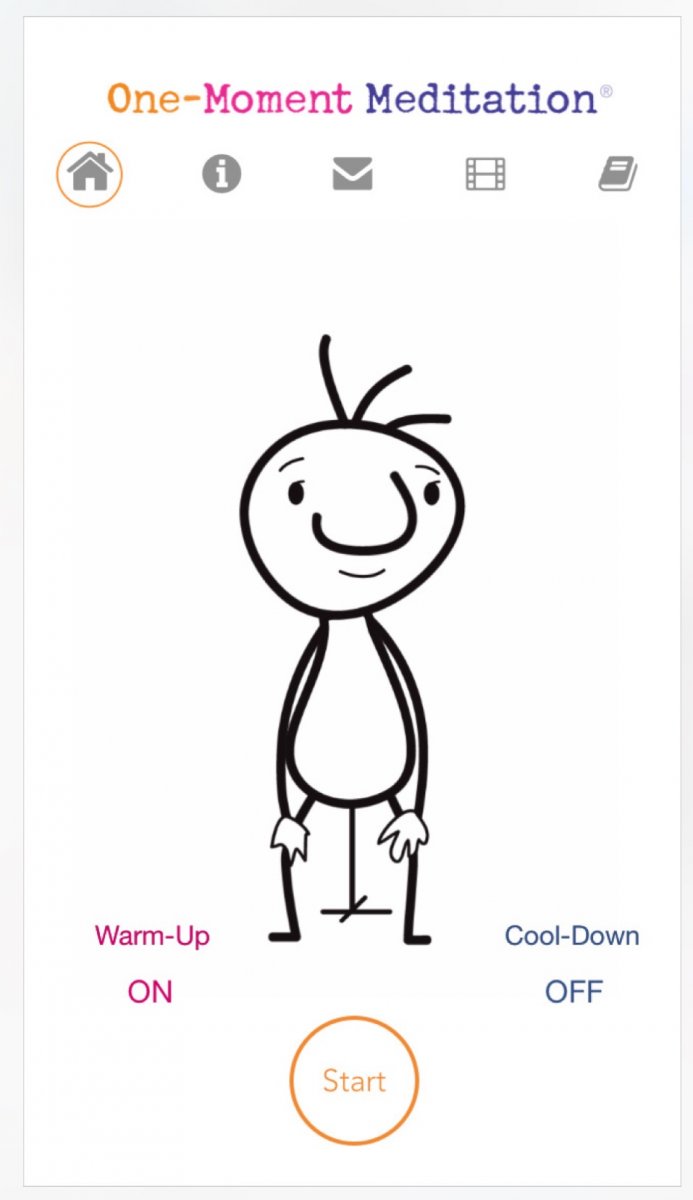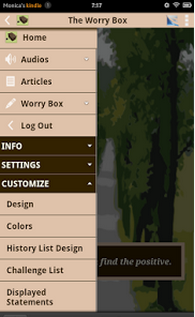Staff Perspective: Smartphone Apps for the Anxiety-Minded
Over the past few years, I’ve been forced to accept that I sound more and more like my grandparents, complaining about new technology that they just can’t keep up with. And, like that generation, I’ve reluctantly embraced the advancements, admitting that some of them are… well…. pretty darned cool! The examples at hand are “apps”, specifically ones that professionally help both us and our patients. For this week, I want to review two in particular that I’ve found helpful, especially for those needing extra help learning to relax and unjumble their minds. Before I give specifics, here is a quick disclaimer: I am not electronically-minded. If I am going to appreciate an app, it has to be intuitive to use and not very cluttered. If this style appeals to you, read on.
 “One-Moment Meditation®” (iOS and Android) is an app designed to help people learn how to take a minute and relax or meditate. Literally, it takes a minute. The designers describe that you can use it to both calm down during the day or wake up and become alert. This would depend on the person and what they are meditating on. Either way, it can help unclutter the mind and focus in order to be more relaxed and mindful. When it comes to meditation or relaxation exercises, I’m actually one of those people who can’t stand guided imagery. I am already really good at guiding my own mind and I find someone else giving me instructions, or even encouragement, to be an unwelcome interruption that definitely does not help my relaxation. I have found many patients are also this way. They are better able to develop calming and focusing images on their own and get annoyed at me when I try to guide what they are visualizing. So I particularly appreciate One-Moment Medication because it does not do this. There is a warm-up and warm-down period, if you choose, where it will give non-specific directions on how to begin or end, but the actual minute of medication starts with a chime tone and then literally times a minute, ending with another chime tone and no other sound between. To test this before suggesting it to you or patients, I spent a week using it a few times during the day. I was a bit skeptical at first, thinking that it would need to be more involved in order to help me during a hectic day. I was happily surprised that interrupting a stressful moment, even just for a minute, really helped my tension and focus. It was a much-needed short break for my mind to quiet and then reengage with work or whatever I was doing in a more clear way where I was able to choose what to re-attend to.
“One-Moment Meditation®” (iOS and Android) is an app designed to help people learn how to take a minute and relax or meditate. Literally, it takes a minute. The designers describe that you can use it to both calm down during the day or wake up and become alert. This would depend on the person and what they are meditating on. Either way, it can help unclutter the mind and focus in order to be more relaxed and mindful. When it comes to meditation or relaxation exercises, I’m actually one of those people who can’t stand guided imagery. I am already really good at guiding my own mind and I find someone else giving me instructions, or even encouragement, to be an unwelcome interruption that definitely does not help my relaxation. I have found many patients are also this way. They are better able to develop calming and focusing images on their own and get annoyed at me when I try to guide what they are visualizing. So I particularly appreciate One-Moment Medication because it does not do this. There is a warm-up and warm-down period, if you choose, where it will give non-specific directions on how to begin or end, but the actual minute of medication starts with a chime tone and then literally times a minute, ending with another chime tone and no other sound between. To test this before suggesting it to you or patients, I spent a week using it a few times during the day. I was a bit skeptical at first, thinking that it would need to be more involved in order to help me during a hectic day. I was happily surprised that interrupting a stressful moment, even just for a minute, really helped my tension and focus. It was a much-needed short break for my mind to quiet and then reengage with work or whatever I was doing in a more clear way where I was able to choose what to re-attend to.
 The second app I would like to recommend are for those that struggle to let go of their anxiety, even if they become masters at the above or other medication techniques. We all know people like this, and may grudgingly admit we are one of them! It is called “The Worry Box.” (Android only) It is definitely more interactive and involved than “One-Moment Meditation”, but it is supposed to be. It is designed as a place for people to type in what they are worried about, so they don’t have to worry about forgetting them. This app includes options to have inspirational reminders for the anxious-at-heart, as well as options to remind you about different things that may need to be attended to at specific times. I chose a few work related due dates that I was stressed about, and the app prompted me to add pre-chosen statements that would help me relax more about the worry. Each time I look at them, I am reminded that “I can tolerate this, it won’t be forever”, my particular favorite encouragement. Believe it or not, it did seem to help. I could see how this would help with some of my more anxious patients, especially younger ones that simply don’t want to use pen and paper, or need to carry their “worry box” around with them throughout the day. This app also has options that are educational about Cognitive-Behavioral techniques, managing stress, coping with change, and other things that could assist people with learning how to modify their anxiety. There are different aspects to this app, including the ability to customize it to the specific individual’s taste. I would encourage a provider to review it before suggesting it to patients so you can make sure it meets their need and you can answer their questions.
The second app I would like to recommend are for those that struggle to let go of their anxiety, even if they become masters at the above or other medication techniques. We all know people like this, and may grudgingly admit we are one of them! It is called “The Worry Box.” (Android only) It is definitely more interactive and involved than “One-Moment Meditation”, but it is supposed to be. It is designed as a place for people to type in what they are worried about, so they don’t have to worry about forgetting them. This app includes options to have inspirational reminders for the anxious-at-heart, as well as options to remind you about different things that may need to be attended to at specific times. I chose a few work related due dates that I was stressed about, and the app prompted me to add pre-chosen statements that would help me relax more about the worry. Each time I look at them, I am reminded that “I can tolerate this, it won’t be forever”, my particular favorite encouragement. Believe it or not, it did seem to help. I could see how this would help with some of my more anxious patients, especially younger ones that simply don’t want to use pen and paper, or need to carry their “worry box” around with them throughout the day. This app also has options that are educational about Cognitive-Behavioral techniques, managing stress, coping with change, and other things that could assist people with learning how to modify their anxiety. There are different aspects to this app, including the ability to customize it to the specific individual’s taste. I would encourage a provider to review it before suggesting it to patients so you can make sure it meets their need and you can answer their questions.
Like most free apps, both of the ones described above have options to purchase the expanded version. Being more cheap than not, and still slightly adverse to “new-fangled technology,” I have not done this for these particular apps and therefore don’t know what the upgrades add. But I can say that there were not the annoying flashing advertisements that are constantly on the screen. Nothing I saw interrupted the flow of using these apps, which was greatly appreciated.
Even my non-electronically minded mind truly believes that using apps can be a highly useful tool within our profession, especially when working with younger individuals and/or those that enjoy what technology has to offer. There are many incredible professional apps out there. I encourage you to simply jump, in especially if you are hesitant to engage with the world where typing happens on a smartphone. Explore what is out there. You may be pleasantly surprised with how simple it can make some of your professional tasks.
Dr. Debra Nofziger is a Deployment Behavioral Health Psychologist with the Center for Deployment Psychology. She currently holds the CDP position at Brooke Army Medical Center in San Antonio Texas.
Over the past few years, I’ve been forced to accept that I sound more and more like my grandparents, complaining about new technology that they just can’t keep up with. And, like that generation, I’ve reluctantly embraced the advancements, admitting that some of them are… well…. pretty darned cool! The examples at hand are “apps”, specifically ones that professionally help both us and our patients. For this week, I want to review two in particular that I’ve found helpful, especially for those needing extra help learning to relax and unjumble their minds. Before I give specifics, here is a quick disclaimer: I am not electronically-minded. If I am going to appreciate an app, it has to be intuitive to use and not very cluttered. If this style appeals to you, read on.
“One-Moment Meditation®” (iOS and Android) is an app designed to help people learn how to take a minute and relax or meditate. Literally, it takes a minute. The designers describe that you can use it to both calm down during the day or wake up and become alert. This would depend on the person and what they are meditating on. Either way, it can help unclutter the mind and focus in order to be more relaxed and mindful. When it comes to meditation or relaxation exercises, I’m actually one of those people who can’t stand guided imagery. I am already really good at guiding my own mind and I find someone else giving me instructions, or even encouragement, to be an unwelcome interruption that definitely does not help my relaxation. I have found many patients are also this way. They are better able to develop calming and focusing images on their own and get annoyed at me when I try to guide what they are visualizing. So I particularly appreciate One-Moment Medication because it does not do this. There is a warm-up and warm-down period, if you choose, where it will give non-specific directions on how to begin or end, but the actual minute of medication starts with a chime tone and then literally times a minute, ending with another chime tone and no other sound between. To test this before suggesting it to you or patients, I spent a week using it a few times during the day. I was a bit skeptical at first, thinking that it would need to be more involved in order to help me during a hectic day. I was happily surprised that interrupting a stressful moment, even just for a minute, really helped my tension and focus. It was a much-needed short break for my mind to quiet and then reengage with work or whatever I was doing in a more clear way where I was able to choose what to re-attend to.
 The second app I would like to recommend are for those that struggle to let go of their anxiety, even if they become masters at the above or other medication techniques. We all know people like this, and may grudgingly admit we are one of them! It is called “The Worry Box.” (Android only) It is definitely more interactive and involved than “One-Moment Meditation”, but it is supposed to be. It is designed as a place for people to type in what they are worried about, so they don’t have to worry about forgetting them. This app includes options to have inspirational reminders for the anxious-at-heart, as well as options to remind you about different things that may need to be attended to at specific times. I chose a few work related due dates that I was stressed about, and the app prompted me to add pre-chosen statements that would help me relax more about the worry. Each time I look at them, I am reminded that “I can tolerate this, it won’t be forever”, my particular favorite encouragement. Believe it or not, it did seem to help. I could see how this would help with some of my more anxious patients, especially younger ones that simply don’t want to use pen and paper, or need to carry their “worry box” around with them throughout the day. This app also has options that are educational about Cognitive-Behavioral techniques, managing stress, coping with change, and other things that could assist people with learning how to modify their anxiety. There are different aspects to this app, including the ability to customize it to the specific individual’s taste. I would encourage a provider to review it before suggesting it to patients so you can make sure it meets their need and you can answer their questions.
The second app I would like to recommend are for those that struggle to let go of their anxiety, even if they become masters at the above or other medication techniques. We all know people like this, and may grudgingly admit we are one of them! It is called “The Worry Box.” (Android only) It is definitely more interactive and involved than “One-Moment Meditation”, but it is supposed to be. It is designed as a place for people to type in what they are worried about, so they don’t have to worry about forgetting them. This app includes options to have inspirational reminders for the anxious-at-heart, as well as options to remind you about different things that may need to be attended to at specific times. I chose a few work related due dates that I was stressed about, and the app prompted me to add pre-chosen statements that would help me relax more about the worry. Each time I look at them, I am reminded that “I can tolerate this, it won’t be forever”, my particular favorite encouragement. Believe it or not, it did seem to help. I could see how this would help with some of my more anxious patients, especially younger ones that simply don’t want to use pen and paper, or need to carry their “worry box” around with them throughout the day. This app also has options that are educational about Cognitive-Behavioral techniques, managing stress, coping with change, and other things that could assist people with learning how to modify their anxiety. There are different aspects to this app, including the ability to customize it to the specific individual’s taste. I would encourage a provider to review it before suggesting it to patients so you can make sure it meets their need and you can answer their questions.
Like most free apps, both of the ones described above have options to purchase the expanded version. Being more cheap than not, and still slightly adverse to “new-fangled technology,” I have not done this for these particular apps and therefore don’t know what the upgrades add. But I can say that there were not the annoying flashing advertisements that are constantly on the screen. Nothing I saw interrupted the flow of using these apps, which was greatly appreciated.
Even my non-electronically minded mind truly believes that using apps can be a highly useful tool within our profession, especially when working with younger individuals and/or those that enjoy what technology has to offer. There are many incredible professional apps out there. I encourage you to simply jump, in especially if you are hesitant to engage with the world where typing happens on a smartphone. Explore what is out there. You may be pleasantly surprised with how simple it can make some of your professional tasks.
Dr. Debra Nofziger is a Deployment Behavioral Health Psychologist with the Center for Deployment Psychology. She currently holds the CDP position at Brooke Army Medical Center in San Antonio Texas.

